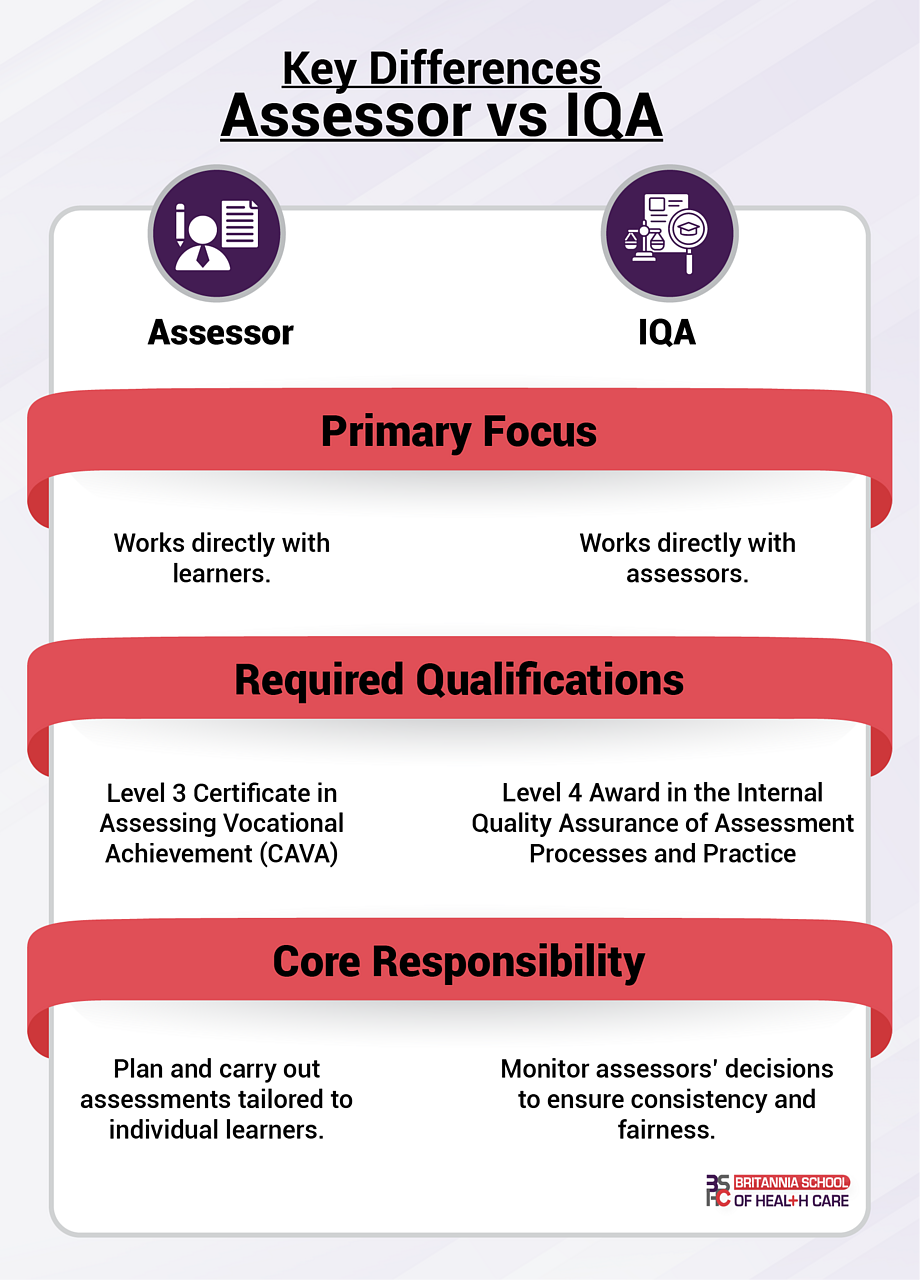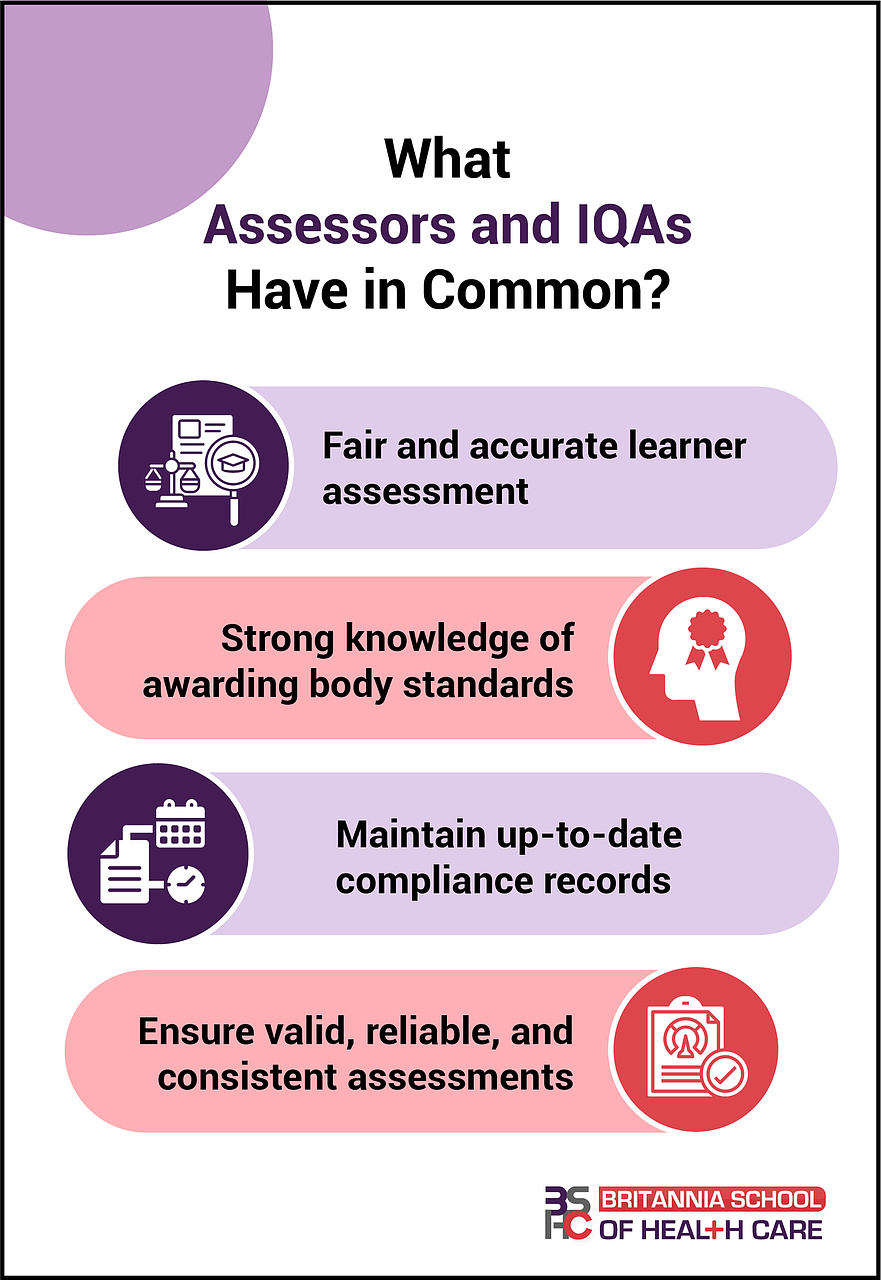In vocational qualifications, the terms of Assessor and Internal Quality Assurer (IQA) are frequently used. Differentiating these terms in detail is always necessary. At first glance, they may sound similar because both are deeply involved in the learner journey and in maintaining assessment standards. However, their responsibilities, career progression, and day-to-day focus are quite different.
This blog will cover in depth about the role of an assessor and IQA, including the qualifications needed for each and how they are used in real life.

What is the Role of an Assessor?
The role of an assessor is generally spoken of as a person who works closely with learners, engaging with them at various stages of their educational journey. Assessors are responsible for evaluating learners’ work and offering advice on how to improve it in order to meet the necessary qualification requirements. Essentially, assessors are the first line of quality in the assessment process.
What Qualifications do you need to be an Assessor?
You need to have the following qualifications to become a qualified assessor:
Level 3 Certificate in Assessing Vocational Achievement (CAVA) – the common qualification that provides the skill to assess the competence of learners in both classroom and real-world settings.
Level 3 Award in Assessing Competence in the Work Environment – the qualification gives knowledge about assessing occupational competence in the work environment
Level 3 Award in Understanding the Principles and Practices of Assessment – the theory-based, preliminary qualification offers a strong basis in the fundamental concepts, legal requirements, and assessment procedures.
What are the Key Duties of an Assessor?
Develop Assessment Plans – designing individualised assessment plans according to the requirements for learners
Address Learning Styles – developing assessments according to the kinaesthetic, visual, and auditory learning styles of learners
Aknowledge Workplace Constraints – assessing the work of learners while tailoring assessments for specific tasks, responsibilities, and time constraints.
Give Constructive Feedback – Providing tailored feedback to learners based on their strengths and areas of development.
Assess the Evidence – Making sure the provided evidence satisfies the standards of the awarding body and the necessary requirements.
Support Learners’ Progression – Assisting learners during their educational journey by providing the necessary support and guidance.
What is the Role of an IQA?
The role of Internal Quality Assurer (IQA) extends beyond that of assessor. IQAs work together with assessors to ensure the quality of work throughout the organisation. IQA serves as a moderator, eliminating the gap between assessment quality across different assessors.
What Qualifications do you need to be an IQA?
The first step in becoming a qualified IQA is to achieve qualified assessor status. Then you need to have the following qualifications to become a qualified IQA:
Level 4 Award in the Internal Quality Assurance of Assessment Processes and Practices – A standardised qualification providing the knowledge of the concepts and methods needed to carry out effective internal quality assurance processes.
Level 4 Award in Understanding Internal Quality Assurance of Assessment Processes and Practice – knowledge-only award, enhances the conceptual understanding of quality assurance systems and processes.
What are the Key Duties of an IQA?
Monitor Assessment Decisions – Judging assessors decision to ensure reliability, accuracy and consistency according to defined standards.
Organise Standardisation Activities – Carry out standardisation activities for assessors to ensure the quality of assessment processes.
Ensure Compliance – Complying with regulatory and awarding bodies requirements by maintaining assessment and quality assurance standards.
Give Support and Feedback – Providing direction and assistance to assessors while making sure the practice satisfies the required standards.
Do Assessor and IQA Roles Overlap?
Yes, the roles of an Assessor and an IQA do overlap. Both roles aim to meet the standards of the awarding body, maintain the fairness and quality of assessments, and offer guidance to both assessors and learners.

Assessors and IQAs both have the following similar characteristics:
✅ Ensure learners are assessed fairly, accurately, and according to the standards.
✅ Comprehensive knowledge of the awarding body requirements, assessment criteria, and regulatory frameworks.
✅Maintain current and up-to-date records for ensuring compliance.
✅ Make sure assessments are valid, reliable and consistent with standards.
Assessor vs IQA: A Practical Example of Overlap
In a real-world work setting, a Health and Social Care qualification learner is being assessed while providing personal care assistance to a resident.
Assessor’s Role: In this case, the assessor’s duties involve observing the learner carry out their task, assessing the work in keeping with the assessment standards, recording evidence, and providing feedback to the learner.
The Overlap Role of IQA: The IQA later reviews the observation record, confirms the accuracy and accuracy of the assessor’s judgement, and concludes that the feedback provided fulfils the awarding body requirements.
Conclusion: The Assessor and IQA Partnership in Education
The assessor and IQA have an interdependent relationship: both aim to ensure the organisation’s assessment process is accurate and consistent. Their coordinated efforts strengthen the framework of UK vocational education. Both assessors and IQAs depend on one another to function effectively; assessors assist learners with their learning tasks, while IQAs ensure the quality of assessors’ work. Overall, both roles are inseparable and are crucial to maintaining the standard of education.

